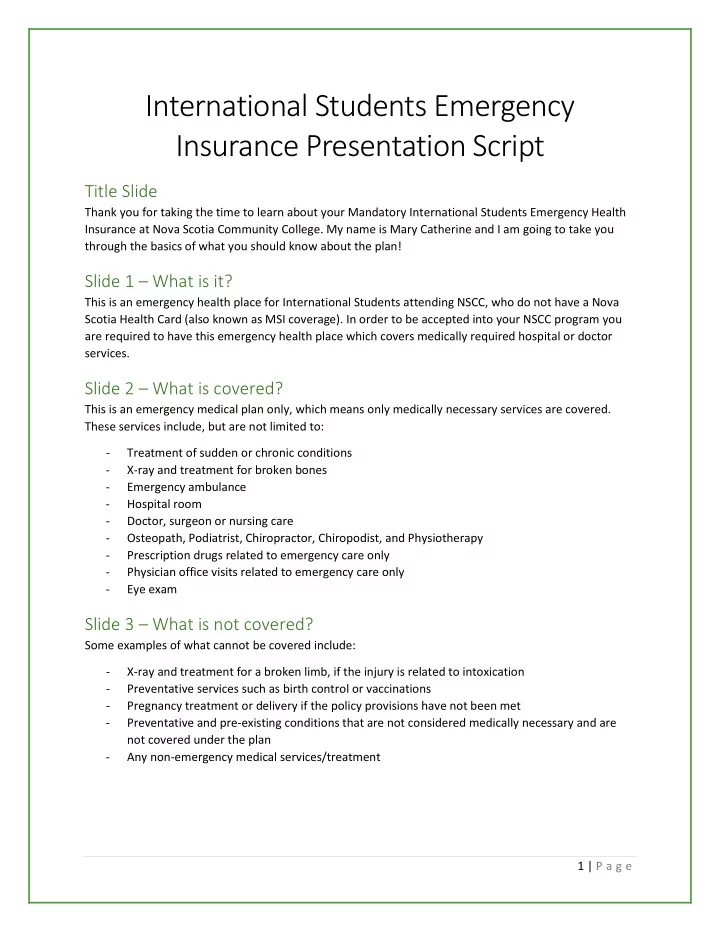

International Students Emergency Insurance Presentation Script Title Slide Thank you for taking the time to learn about your Mandatory International Students Emergency Health Insurance at Nova Scotia Community College. My name is Mary Catherine and I am going to take you through the basics of what you should know about the plan! Slide 1 – What is it? This is an emergency health place for International Students attending NSCC, who do not have a Nova Scotia Health Card (also known as MSI coverage). In order to be accepted into your NSCC program you are required to have this emergency health place which covers medically required hospital or doctor services. Slide 2 – What is covered? This is an emergency medical plan only, which means only medically necessary services are covered. These services include, but are not limited to: - Treatment of sudden or chronic conditions - X-ray and treatment for broken bones - Emergency ambulance - Hospital room - Doctor, surgeon or nursing care - Osteopath, Podiatrist, Chiropractor, Chiropodist, and Physiotherapy - Prescription drugs related to emergency care only - Physician office visits related to emergency care only - Eye exam Slide 3 – What is not covered? Some examples of what cannot be covered include: - X-ray and treatment for a broken limb, if the injury is related to intoxication - Preventative services such as birth control or vaccinations - Pregnancy treatment or delivery if the policy provisions have not been met - Preventative and pre-existing conditions that are not considered medically necessary and are not covered under the plan - Any non-emergency medical services/treatment 1 | P a g e
Slide 4 – What does the plan cost? The plan costs $650 for 12-months coverage for a single student. This payment is made upon paying tuition for your program Family plans are available for $1595. Slide 5 – When does my coverage start? The plan has a start date of September 1 st . Enrolment can take up until mid-October, therefore accounts do not get activated until the end of October. Any medical expenses during that time must be paid out of pocket by the student and upon account activation the claim can be submitted for reimbursement. Make sure to keep any receipts of medical expenses that are covered through the plan. Slide 6 – Where can I get medical treatment? You can seek treatment at a hospital emergency department or a walk-in clinic. If the emergency is not life threatening, visiting a walk-in clinic will save you time. You may have to pay a small administration fee at a walk-in clinic, but this can be claimed for reimbursement when you submit your claim form to the insurer. Slide 7 – What do I do if I visit a walk-in or hospital? If you visit a walk-in clinic or hospital, you must contact TIC Emergency Assistance before receiving and medical consultation or surgery being performed, or within 24 hours of being admitted to a hospital. Failure to notify TIC, without a reasonable cause, will result in the reduction of eligible benefits amount payable. To contact TIC Emergency Assistance, you can call toll-free at 1-800-995-1662 or worldwide collect at 416-240-0049. Slide 8 – Where do I get medication? If your doctor prescribes you a drug related to an emergency treatment, you can access this medication by bringing the prescription to a pharmacy. Local pharmacies include Shoppers Drug Mart, Lawtons, and Guardian. Over-the-counter medication for issues that are considered no emergent, such as the common-cold or a sore throat, can be purchased at these pharmacies as well. 2 | P a g e
Slide 9 – Emergency vs. Non-Emergency Examples of what is considered emergency include - Difficulty breathing - Fainting - Chest pain - Uncontrolled bleeding - Sudden severe pain - Serious injury (broken bone) Examples of what is considered non-emergent include: - Common cold or flu - Earache - Sore throat If you are unsure if your condition is considered an emergency, call the Nurses Hotlin at 811. A registered nurse on the line will help you determine whether you should seek emergency care or not. Slide 10 – Where can I direct future questions? You can contact myself, Mary Catherine MacDonald, at the NSCC Student Benefits Office located at the I.T. Campus. You can drop into the office Monday-Friday 9-4, call in at 902-491-1624 or toll free at 1-866-491-1624, or by email to nsccplan@mystudentplan.ca Questions in regards to submitted claims can be directed to TIC at 1-800-995-1662. 3 | P a g e
Recommend
More recommend